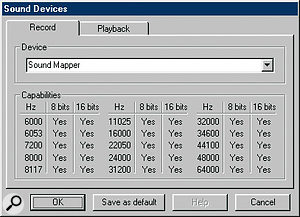

However, it isn't really a driver, but a virtual device installed automatically with Windows, which simply results in your application using whatever default devices you've already chosen for both sound recording and sound playback in the Control Panel's 'Sounds and Audio Devices' applet.
#Microsoft sound mapper driver install
Microsoft's Sound Mapper (which sometimes appears in audio applications as 'MME-WDM Microsoft Sound Mapper' or simply 'Wave Mapper') often becomes the default driver for both audio playback and recording after you install a new audio application, and it may if you've recently installed a new audio interface. If you see several entries relating to your audio interface, always use the one containing 'ASIO' in preference to any MME-WDM ones, as they will provide significantly lower latency. So to cure your problem just open up the Sound Forge audio preferences dialogue and specifically select your audio interface as the playback device. PC music specialist Martin Walker replies: For once, this is an easy question to answer, since the only way you can get a 'Microsoft Sound Mapper' error is if you've selected this named option in Sound Forge as either your recording or playback device.

For example, if you need to play old multimedia files, Sound Mapper can be used, as it can play back files with sample rates as low as 6kHz.

Now that the majority of audio interfaces have ASIO drivers, Microsoft's Sound Mapper device is almost completely redundant.
#Microsoft sound mapper driver how to
Could you guide me on how to solve this problem? I have no idea what Microsoft Sound Mapper is. It said that the Microsoft Sound Mapper does not recognise or support this application due to rates and frequency settings. I use Sound Forge to record on to my laptop, and until very recently it's been working fine - until an error popped up when I opened the program.


 0 kommentar(er)
0 kommentar(er)
